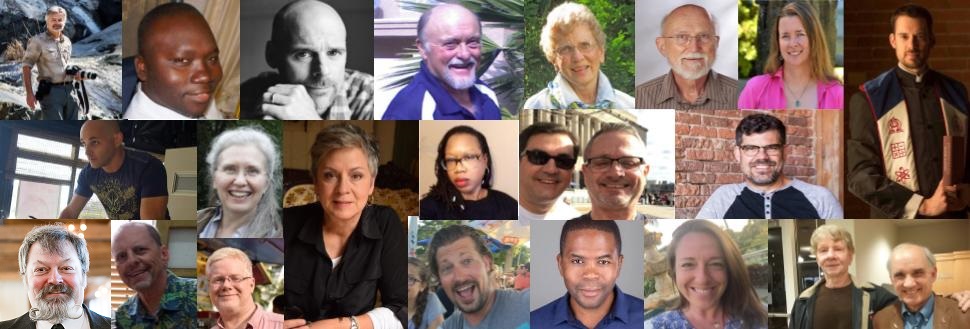
Ches Smith
In Southern Baptist circles, they say “once saved, always saved” as if there’s no going back. They say something similar about alcoholics so I can’t help but picture myself seated in a circle in the middle of a gymnasium, waiting for my turn to stand up and say, “Hi. My name is Ches and I’m a Jesuholic.” Anyway, I’m from Houston, married with three children, and I work as a computer tech at a middle school. I have a background in art and I’m also an author. My first novel, Under the Suns, was published in August 2014.
I became a Christian when I was 15 and believed I was called by God into the ministry when I was 17. I went to Howard Payne University and graduated in 1996 with a BA in biblical studies and a minor in philosophy. During that time, I was licensed into the ministry, held a co-pastor position for about a year and a half, and was ordained the day after graduation. I was married two weeks after that. The following fall, I moved to Fort Worth, TX to begin my Masters of Divinity at Southwestern Baptist Theological Seminary.
That’s when my descent into madness began. Well, it felt like it, at least. I spent the next four years at Southwestern, taking a full class load at first, then dwindling to one class a semester until finally leaving in 2000 without completing the degree. I’ve always been full of questions and, for a time, the questions invigorated me, spurred me forward, but the fewer answers I got, the more the pursuit became laborious.
I was miserable at Southwestern. I couldn’t ever find my place or, more specifically, God gave me no place. I’m a very introverted person by nature, not outgoing or outspoken, and I have an artist’s temperament. What I found was that that particular seminary was no place for someone like me. So many of my fellow students seemed to consider themselves Billy Graham 2.0, God’s personal conduit to the people—outgoing, driven, charismatic. I was none of that. I began to feel like success in ministry had more to do with the minister than with God.
I was riddled with feelings of guilt—guilt that I wasn’t praying enough, studying the Bible enough, getting involved in church enough, evangelizing enough, tithing enough. But that says it all, doesn’t it? Look at the burden on me, rather than God. Where was God?
In spite of all that, I remained in the faith. My wife and I and our new baby moved to be near her family and I experienced a spiritual reinvigoration. I started teaching a Sunday school and occasionally preached. In 2001, we moved back to Houston and I re-enrolled in seminary at the satellite campus there. My home pastor was also a professor at the seminary and, by and large, the atmosphere of that campus was much more palatable. I started a Sunday school class for young married couples and was given a voluntary staff position, Minister to the Arts, at the church.
The same themes continued to haunt me, though. As hard as I tried to push them to the back of my mind, they became insurmountable. I was consumed by the concepts of indifference, chance, and probability.
There was the pastor who was electrocuted in the baptismal waters down in Waco. The local church bus that was in an accident, seventeen of its God-fearing passengers killed. Or the time, while I was at the seminary in Ft. Worth, when a man walked into a teen prayer rally at Wedgwood Baptist Church and killed seven people, one of my classmates among them. Indifference. Chance. Probability. Most of the time, things work out as expected. Occasionally things go spectacularlywell, while other times, things go horribly wrong. Certainly seems like a world with no guiding hand.
What I noticed is that the faithful hedge their bets. They pray “if it be your will,” but what is that, but a way to rig the game? “If it be your will” ensures that God always answers, all the time. It’s a way of baptizing chance, making it holy, something more than it is.
In 2007, still clinging to faith, I had a bad bout of depression and sought counseling. The counselor identified the problem the first time I met with him—my faith struggle had catapulted me into a bout of major depression. My doubt was like an open wound, festering, taking a toll on my physical body. I had to deal with it, to face it head on. For the first time, I consciously decided that I should consider the idea that there might not be a God.
I read an interview with Douglas Adams and he mentioned the “Selfish Gene” by Richard Dawkins. I bought the book and was an agnostic before I finished it. I watched atheist/theist debates on youtube, read books like “The God Delusion,” “God is Not Great,” “Jesus, Interrupted,” “The End of Faith,” among many others. I engaged in online debates of my own and found the arguments for god hopelessly lacking.
I felt like Dorothy peeking behind the curtain in The Wizard of Oz to find some silly old man there, hardly a God. I took one blasphemous little step across the line of belief, looked back, and found a gulf between me and my former perspective. I was done with the Christian faith.
I always tell people that I didn’t choose unbelief, unbelief happened to me. The transition was the hardest things I’ve ever been through, it came close to killing me, but I’m finding hope and purpose again.
It just looks a little different now.

